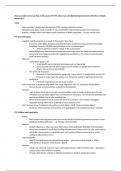How accurate is it to say that, in the years 1917-55, there was very limited improvement in the lives of black
Americans?
Intro:
- Many consider Montgomery Bus Boycott 1955, turning point into success
- Although some gains made, accurate to say very limited improvement as gains not enforced in
practice, changes often only helped small proportion of black population – de jure not de facto
P1: Economic gains
- Arguably, significant gains as a result of Roosevelt + New Deal
o Executive Order 8802, banning racial discrimination in defence industry (May 1941 Philip
Randolph threat of 100,000 strong all-black march on Washington)
1942 3% defence workers = black 8% 2 years later
o National Recovery Administration made minimum wage equal for black and white workers
o Some New Deal measures indirectly helped black people (e.g. 1/3 of low-income housing
built had black tenants)
- However…
o Gains didn’t apply to all:
1936 NAACP report said 6mil AA farmers got no federal aid
Social security reforms didn’t apply to farm workers or people who worked in
others’ houses (many were black)
o Not enforced in practice
Roosevelt’s New Deal policies apparently ‘colour-blind’, in reality blacks moved off
projects to make room for whites (e.g. thousands sacked in agricultural reforms)
o Ineffective
Minimum wage priced AA out of job market
- Gains made due to Northern Migration (The Great Migration 1917-32, migration during WW2)
o More jobs and accommodation available to black people
- However
o Jobs in these areas were low paid, accommodation often in most run-down part of area,
crowded, rent was often higher than a white person would pay, not all had low-paid jobs, but
most (even skilled) had to take unskilled jobs
o those who remained in South worse off, labor force shrank – farm workers struggled
o migration during WW2 led to outbreak of racist violence 1943
- 1947 Truman set up President’s Committee on civil rights – 1948 ‘To Secure these Rights’
o However, 1954 proposed anti-lynching, anti-segregation, Fair employment laws - blocked
P2: Political and Legal gains
- Voting
o Black people who migrated could vote and be elected to federal government (came to have
significant political influence – e.g. Chicago 1919 election)
- However
o limited influence in cities (e.g. New York) where white politicians had tight hold on politics
o those who remained in South faced voting discrimination: literacy tests to vote, some places
had to be a homeowner (most blacks were not), polling stations surrounded by whites
waiting to attack black voters
- Legal challenges
o NAACP provided lawyers to defend black people – won every case it fought in 1950s
o 1948 Shelley v. Kraemer, 1954 Brown v Board
- However
o rulings not enforced, Supreme Court used vague phrases, didn’t set time limits – legal gains
useless unless they worked in practice
o 10 years after Brown v Board, 1/100 black students in South in integrated school




